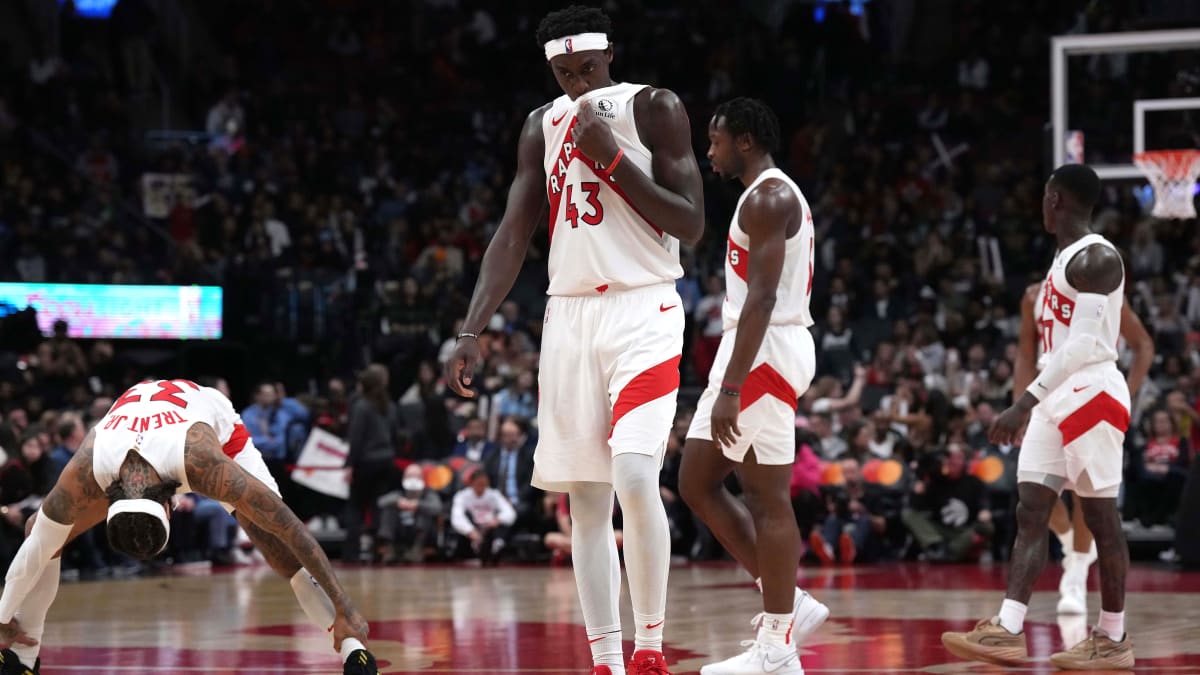Dating back to last season’s trade deadline, when the Raptors stood pat (aside from adding center Jakob Poeltl), there have been huge questions looming for the Toronto franchise.
What’s the ultimate aim for this club, which undoubtedly has talent, but still appears to be a major piece (probably two) away from title contention? When is the ideal time—the offseason, or the midseason trade deadline—to part ways with an asset? And, if you don’t pull the trigger on either option, what is the tangible cost of letting a solid player walk for nothing at all?
The latter question has come into crystal-clear focus just four games into the campaign.

Nick Turchiaro/USA TODAY Sports
The Raptors, who lost starting point guard Fred VanVleet to the Rockets in free agency without getting anything back for him, are scoring a minuscule, league-worst 81 points per 100 half-court possessions so far this season, per Synergy Sports. That’s considerably behind the next-worst offense, the Knicks, whose best two scorers, Jalen Brunson and Julius Randle, are off to career-worst starts, shooting just 29% and 25.9%, respectively, from two-point range.
There are a couple of key concerns for Toronto and new coach Darko Rajaković in half-court situations. The most apparent one is that the club is getting virtually nothing when it drives to the basket these days. Specifically, the Raptors are shooting 30.1% from the field when they drive to the basket, the NBA’s worst mark by a country mile. The next-lowest shooting percentage, which belongs to Minnesota, is more than nine percentage points higher.
Secondly, the Raptors are accomplishing very little when they go to backup point guard Malachi Flynn, scoring just 80 points per 100 possessions in the 42 minutes he’s been on the court this season. That’s a more than 28-point drop-off per 100 possessions offensively compared to when he’s off the court. (Though Pascal Siakam and Scottie Barnes handle the ball plenty, newcomer Dennis Schröder is the team’s starting point guard.) So it’s clear they need to find a way to bolster those minutes when Flynn is at the helm.
To be clear: This isn’t to suggest VanVleet was perfect. The Raptors often struggled to finish at the rim with him at the helm, too. And among players who attempted at least 1,000 shots from the field last season, VanVleet’s field goal percentage (39.3%) was dead last.
Still, it’s worth revisiting comments from just a few weeks ago, when team president Masai Ujiri seemed to point to selfishness and a need to “play the right way” this season. It’s unclear that was ever really the problem with this group—something evidenced by the fact that, currently, the Raptors are passing the ball plenty. In fact, Toronto is dishing out more passes per game, 315.5, than any other team in basketball. Yet they often aren’t the sort of productive dimes that force the defense to chase, or that lead to scores. In their four contests so far, the Raptors have managed to hit the century mark twice. And one of those, a 104–103 defeat to Chicago, only came about after playing a five-minute overtime. (On Monday, they managed just 91 points—and often looked like they were playing in quicksand—at home against a young Blazers club that came in rated as one of the league’s three worst defenses.)
If it’s any consolation, the Raps—wings Siakam and OG Anunoby in particular—have been great in transition, averaging 21.8 fast-break points; good for second best in the league. And getting stops hasn’t been an issue for Toronto, which has the NBA’s third-most efficient defense. (Limiting second-chance opportunities, however, has been a huge struggle.) Opponents are shooting just 27.8% from three-point range against the Raptors to this point.
The defense and the transition offense are among the bright spots in Toronto for now. Still, it’s hard to look past the half-court offense, which at times looks straight out of the Dark Ages.







